25 YEARS
OF NURTURING KNOWLEDGE
The Institute celebrates
The story of our institute
Milestones

A $17.3 million CFI grant, matched by contributions from the Quebec government and Université Laval, is helping to finance the renovation of the Services Pavilion and the food processing laboratory in the Comtois Pavilion of Université Laval’s Faculty of Agricultural and Food Sciences (FSAA). This innovative project, spearheaded by Paul Paquin and André Gosselin, has led to the creation of an institute dedicated to the study of nutraceuticals and functional foods for the prevention of chronic diseases. The renovated laboratories include state-of-the-art equipment in molecular biology, analytical chemistry and microbiology, as well as a clinical investigation unit. The application is supported by 10 research members and fosters interdisciplinary collaboration within existing FSAA groupings, including the Dairy Science and Technology Research Centre, the STELA Centre, the Horticulture Research Centre, the Agrifood Economics Research Centre and the Reproductive Biology Research Centre.
This milestone marks the official start of scientific and training activities at INAF, formerly IRAFN, thanks to a structuring grant from Valorisation-Recherche Québec (VRQ). The grant enabled a group of research members from Université Laval to create a pan-Quebec group of scientists from several Quebec universities. The Centre québécois de valorisation des biotechnologies (CQVB) facilitates knowledge transfer through a strategic partnership with the Institute, called “NutraInnovation”. The Société de promotion économique du Québec métropolitain (SPEQM) supports the visibility of the Institute and its central role in regional dynamism.
The VRQ grant funds integrated research ranging from the discovery of molecules to the commercialization of functional foods, including the development of food technologies, in vitro and in vivo human studies on the link between food and health. The grant also covers economic, marketing and consumer aspects, while promoting international collaborations. Paul Paquin, supported by Renée Michaud, orchestrate and coordinate the Institute. Intersectorality and a partnership approach are now part of INAF’s DNA.

The Institute is officially recognized by the University Council of Université Laval. The founding faculties are the FSAA, the Faculty of Medicine and the Faculty of Pharmacy. “The establishment of a university institute that brings together researchers from a variety of disciplines is of the utmost importance in order to increase fundamental knowledge in this field, where biofood sciences and health sciences converge towards solutions designed to improve the health of the population”, stated the document submitted by the three partner faculties. INAF‘s mission will focus on research, development and university training, while promoting the transfer of knowledge and technologies to stakeholders, healthcare professionals and the general public. The financial and strategic support obtained will enable INAF to roll out its first five-year and communications plan.

On the strength of the spin-offs generated by the VRQ grant, INAF obtains its first grant from the Fonds de recherche Québec – secteur Nature et technologies (FRQ) as a strategic cluster in Quebec in the high-priority sectors of biofood, nutrition and health. At the time, INAF brought together some forty scientists from 10 Quebec organizations. This 5-year grant, led by Benoît Lamarche, led to several major discoveries resulting from cross-sectoral research.
With a view to transferring scientific advances in nutrition for the benefit of the population of the greater Quebec City area, INAF management, under the leadership of Benoît Lamarche, has recruited nutritionist Anne Deslauriers to develop a range of nutrition consulting services that will also enrich the research carried out at INAF.
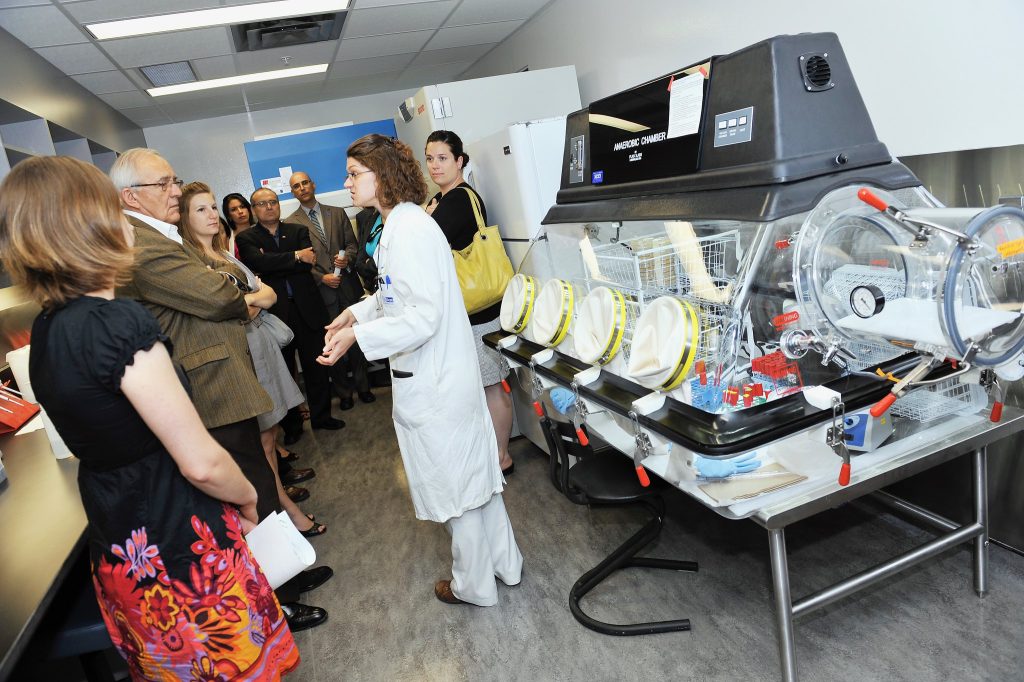
Led by Renée Michaud and then directors Yves Pouliot and Benoît Lamarche, the team submitted an INAF expansion project to the Quebec government’s infrastructure funding support program. This Phase 2 expansion, with a budget of $8 million, saw the addition of a new laboratory wing, the expansion of the clinical investigation unit, and the development of an “innovation hall” that would be the forerunner of the innovation support service. This innovation hall, set up at the entrance to the Services Pavilion, included new meeting and office space, facilitating the relocation of the entire INAF administrative and development team with a view to opening up and transferring knowledge to the community.

An early partner of INAF, the Centre de recherche STELA is celebrating its 25th anniversary. Headed by Sylvie Turgeon, the Centre’s team is drawing up an assessment of its spin-offs in the form of a special report dedicated to this anniversary, and an event bringing together the dairy sector to celebrate this important milestone. This year will also see the award of an honorary doctorate from Laval University to Mr. Jean-Louis Maubois, Director of INRA’s Dairy Research Centre, whose partnership research philosophy inspired the creation of Centre STELA. A special issue of Le lait magazine, with a preface by Mr. Maubois, presents recent results from STELA researchers.
Center STELA is now run by Steve Labrie.
Yves Pouliot then designed a multidisciplinary training program for the food, health and technology (FAST) sector, thanks to 6 years’ funding ($1.65M) from the NSERC-Program de Formation Orienté vers la Concertation et la Nouveauté en Recherche (FONCER) 2010-2016, in collaboration with 9 other colleagues from Université Laval and the University of Manitoba. The FAST program specifically targeted the development of cross-disciplinary skills in candidates from various backgrounds (food science, nutrition, pharmacy, etc.). In its 6 years of existence, the FAST program has provided complementary scholarships and unique practical training opportunities to over 60 undergraduate and graduate students.
Under the leadership of Yves Pouliot, INAF is renewing its operating grant with a scientific program enriched by new dimensions including the concepts of sustainability and eco-efficient processes. On the health front, precision nutrition and epigenetics are gaining in importance. Also, more and more scientists are turning their attention to understanding the individual and environmental determinants that influence adherence to healthy lifestyle habits.
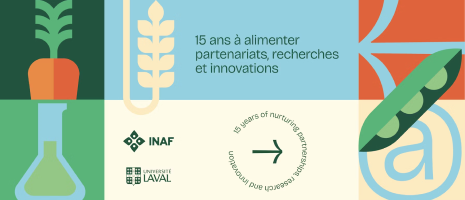
Initiated by Paul Paquin and Renée Michaud, the first edition of BÉNÉFIQ was made possible thanks to the financial and strategic support of MAPAQ and several partners in the innovation ecosystem. From the outset, BÉNÉFIQ has established itself as THE new must-attend event for the ingredients and health foods sector. It brings together INAF scientists and their international partners, as well as many players from the nutrition and bio-food industries. This first resounding success is part of a long-term dynamic, with the biennial event aiming to stimulate partnerships, research and innovation on a global scale.
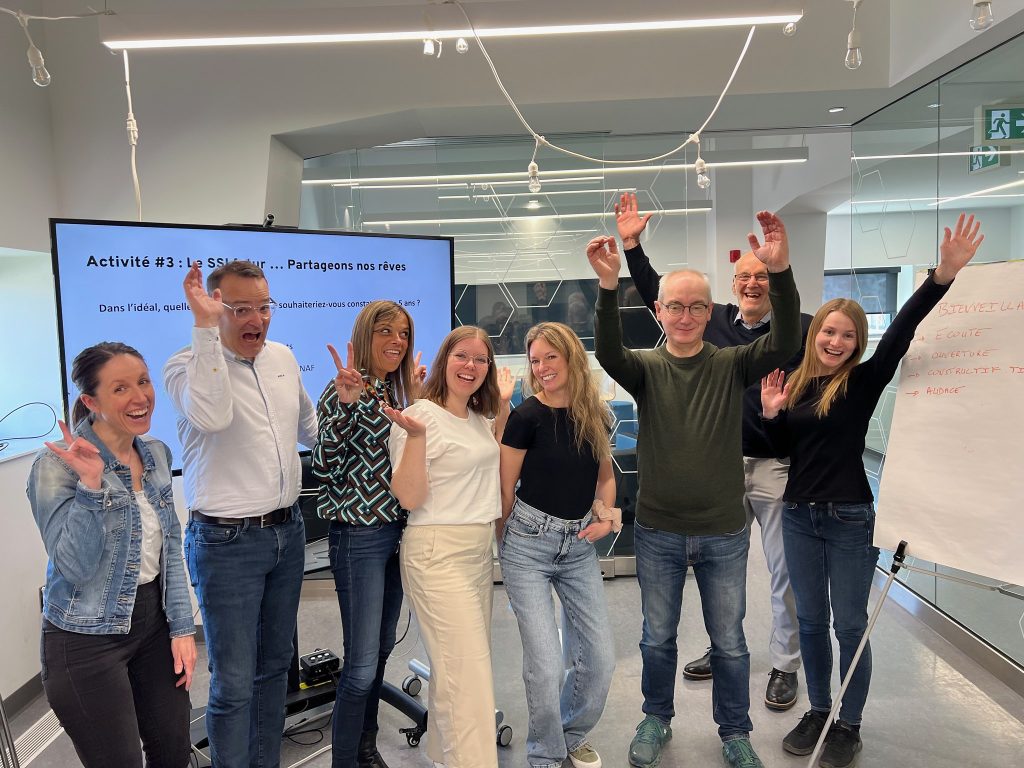
Following on from MAPAQ‘s structuring support for BÉNÉFIQ, INAF management is rolling out a new coaching service dedicated to bio-food sector manufacturers, to support their innovation strategy. Headed by Paul Paquin, the SSI offers companies the opportunity to carry out opportunity studies, obtain regulatory opinions and explore the potential of research and development to fuel innovation. Capitalizing on INAF‘s scientific expertise, ISS adopts a multidisciplinary approach to its projects. The ISS team has grown steadily since its inception. Today, SSI is coordinated by Ronan Corcuff, under the scientific guidance of Angelo Tremblay and Guillaume Brisson.

Transferring knowledge while making an impact on society is part of INAF‘s DNA. It is in this spirit that the Aliment’Terre Day Camps for young people aged 10 to 14 see culinary skills take center stage. Since their launch, Aliment’Terre Day Camps have gone from strength to strength. After 8 years as Chef in Residence, Jean Soulard handed over to Chef Vito Natrella in 2022. Aliment’Terre Camps have been coordinated for over ten years by Louise Corneau, and have provided a unique immersive experience for over 1 000 young people in the region. As a complement, activities are also offered during the spring break to encourage families to get closer to cooking. The success and accessibility of Camps Aliment’Terre are made possible by the support of the FSAA, a number of sponsors and an enduring philanthropic gift from Louise Bourgeois.

This LIA is the fruit of a strategic alliance between the Université de Bordeaux and Université Laval, through the Faculty of Pharmacy. Within this LIA, scientists from INAF in Quebec and the NutriNeuro laboratory in France are joining forces to amplify and accelerate research in the field of nutrition and brain health. This LIA, named “OptiNutriBrain”, is headed by Frédéric Calon at Université Laval and Sophie Layé, from INRAe and Université de Bordeaux, and is coordinated by Éliane Picard-Deland. This LIA has also helped set up the Food4Brain international research network.

The result of a collaboration between scientists at Université Laval‘s INAF and the regional agrifood and biotechnology research laboratory, the Institut Charles Viollette (ICV) at the University of Lille, this LIA is dedicated to the discovery of molecules of interest to health through innovative bioprocesses, as well as to the identification and characterization of natural antimicrobials. At its inception, LIAAN was headed by Pascal Dulster and Djamel Drider for France, and Laurent Bazinet and Ismail Fliss for Quebec. Today, it is headed by Rozenn Lavallec at Université de Lille and Laurent Bazinet at Université Laval, with coordination led by Éliane Picard-Deland.

Inspired by a similar initiative in France, the management of the time, with the financial support of Québec en Forme, undertook a feasibility study for the creation of an Observatory in Quebec. Renée Michaud and Jean-Claude Dufour mobilized key industry players and INAF scientists to set up the Observatory. Thanks to the leadership of the co-directors Véronique Provencher and Laurélie Trudel, the Observatoire has experienced rapid growth, and is now recognized for its inclusive and robust governance, as well as for the relevance of its scientific work and ongoing monitoring of the nutritional quality of 15 food categories sold in Quebec. In 2024, the Observatoire is breaking new ground by launching a new tool, SCAN! enabling food processors to evaluate and position the nutritional quality of their products in comparison with the supply available on the market. The Observatory also focuses on accessibility and nutrition in institutional environments.
Research chairs
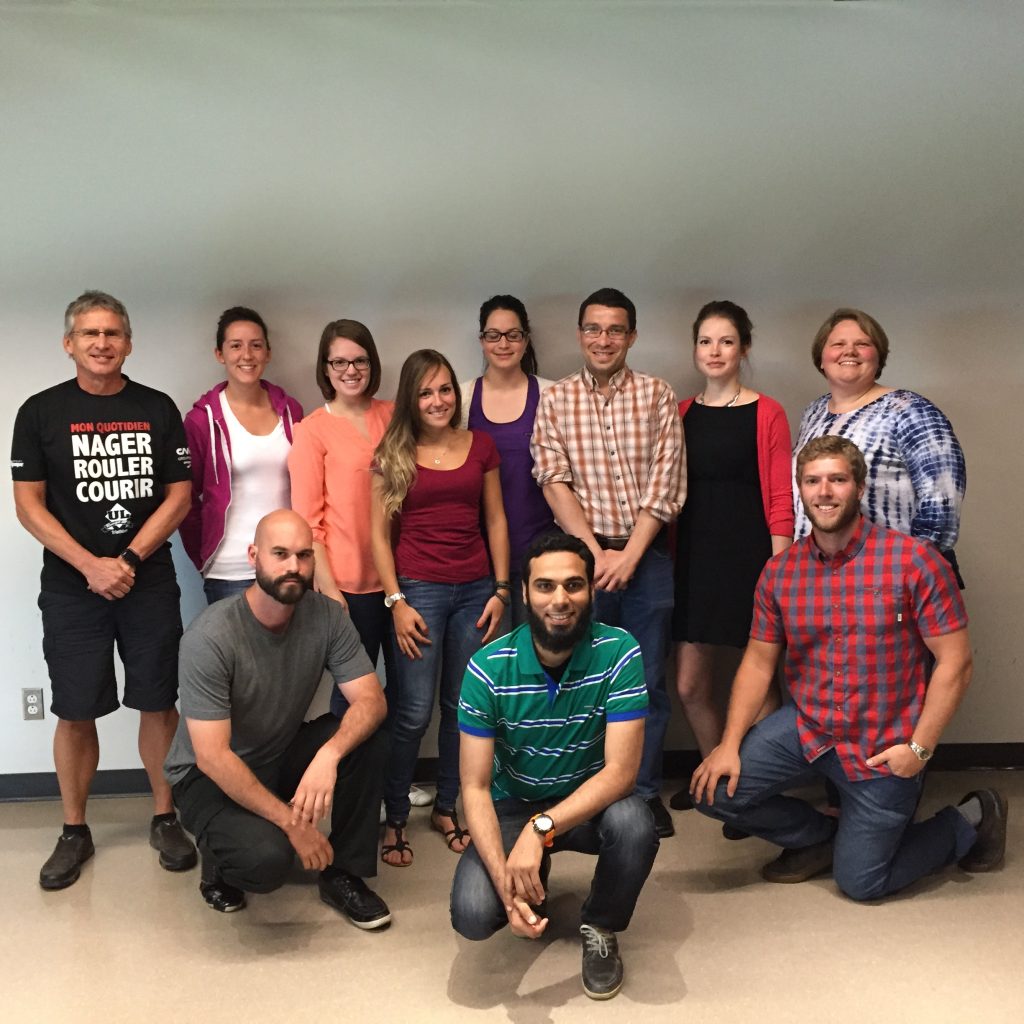
Chairholder: Marc-André Sirard, DMV, PhD.
Chair duration: 2000-2021
Funding partners: Government of Canada
Keywords: reproduction, genomics, epigenetics
Summary: The Research Chair in Reproductive Genomics has developed on 3 parallel plans, namely the creation of an organized data site to describe physiological changes in the ovarian follicle during pre-ovulatory growth. The site developed brings together over 25 databases in a tool that can be used by all researchers interested in ovarian function. This site became universally accessible in 2016. The second component aims to develop a similar approach for oocytes and preimplantation embryos. This site became public in 2017 and contains information on oocytes and embryos. Finally, the third strand concerns the development of intergenerational epigenetics, for which we have developed unique tools applicable to bovines and applicable to microsamples. We have begun to analyze the effects of diet and the age of gamete donors (parents) in cattle to uncover interesting potential for intergenerational modulation. In new developments, we are looking at the influence of the maternal metabolic environment on gene expression in the ovary and embryo.
Main benefits: This Chair has enabled major advances in our understanding of reproduction using genomic tools. The most important findings are 1) The ovarian environment programs oocyte quality in the bovine model, 2) The ovarian environment programs the embryo and leaves an epigenetic signature, 3) The metabolic context in young bulls and cows influences the embryonic program measured on day 7 after conception and possibly the following generation.
These findings indicate the importance of maintaining parents (future sires) in an optimal metabolic environment (neither too fat nor too lean) to ensure embryo quality and the metabolic health of their offspring.
Hyperlinks to some published works: From 2000 to 2021: Over 225 peer-reviewed scientific publications have been published.
Titleholder: Angelo Tremblay, PhD
Chair duration: From 2001 to 2022
- 2001-2008: Canada Research Chair in Physical Activity, Nutrition and Energy Balance.
- 2008-2015: Canada Research Chair in Environment and Energy Balance (renewal and name change).
- 2015-2022: Canada Research Chair in Environment and Energy Balance (renewal).
Team: In collaboration with researchers from the Department of Kinesiology, INAF and CRIUCPQ. Other collaborations have also been developed with other Canadian universities.
Financial partners: NSERC
Keywords: nutrition, physical activity, environment, metabolism, sleep, pollutants, mental work
Summary: The aim of this Chair program was to document environmental influences on energy balance. The program aimed to identify and describe the impact of non-traditional environmental factors on the balance between energy intake and expenditure. It therefore had great potential for scientific innovation and public benefit.
Main spin-offs: The contribution of Professor Tremblay’s Chair has been noted in many spheres of public and scientific life. It has highlighted the fact that a positive energy balance can be induced by factors traditionally little considered. The scientific program took shape in the form of publications and conferences at national and international level. In addition to scientific dissemination, the Chair has led to a commitment to student training, closer links with industry and government agencies, and dissemination to the general public. It has contributed positively to the reputation of Université Laval, and has left a significant legacy for young researchers, healthcare professionals and the general public.
Hyperlinks to some published works: Here are the references of some scientific articles published in connection with the Chair’s themes:
- Pelletier, C., P. Imbeault and A. TREMBLAY. Energy balance and pollution by organochlorines and polychlorinated biphenyls. Rev. 4: 17-24, 2003.
- TREMBLAY, A., C. Pelletier, E. Doucet and P. Imbeault. Thermogenesis and weight loss in obese individuals: a primary association with organochlorine pollution. J. Obes. 28: 936-939, 2004.
- Drapeau, V., J. Blundell, F. Therrien, C. Lawton, D. Richard and A. TREMBLAY. Appetite sensations as a marker of overall intake. J. Nutr. 93: 273-280, 2005.
- TREMBLAY, A., N. Boulé, E. Doucet and S.C. Woods. Is the insulin resistance syndrome the price to be paid to achieve body weight stability? J. Obes. 29: 1295-1298, 2005.
- Drapeau, V., N. King, M. Hetherington, E. Doucet, J. Blundell and A. TREMBLAY. Appetite sensations and satiety quotient : predictors of energy intake and weight loss. Appetite 48: 159-166, 2007.
- Chaput, J.-P. and A. TREMBLAY. Acute effects of knowledge-based work on feeding behavior and energy intake. Behav. 90: 66-72, 2007.
- Chaput, J.-P., J.-P. Després, C. Bouchard and A. TREMBLAY. Short sleep duration is associated with reduced leptin levels and increased adiposity : results from the Quebec Family Study. Obesity 15: 253-261, 2007.
- Major, G.C., E. Doucet, M. Jacqmain, M. St-Onge, C. Bouchard and A. TREMBLAY. Multivitamin and dietary supplements, body weight and appetite: Results from a cross-sectional and a randomized double-blind placebo-controlled study. J. Nutr. 99: 1157-1167, 2008.
- Major, G.C., F. Alarie, J. Doré and A. TREMBLAY. Calcium + vitamin D supplementation and fat mass loss in women very-low calcium consumers: potential link with a calcium-specific appetite control. J. Nutr. 101: 659-663, 2009.
- Arguin, H., M. Sanchez, G.A. Bray, J.C. Lovejoy, J.C. Peters, R.J. Jandacek, J.-P. Chaput and A. TREMBLAY. Impact of adopting a vegan diet or an olestra supplementation on plasma organochlorine concentrations: results from two pilot studies. J. Nutr. 103: 1433-1441, 2010.
- TREMBLAY, A., M-M Royer, J-P Chaput and E. Doucet. Adaptive thermogenesis can make a difference in the ability of obese individuals to lose body weight. J. Obes. 37: 759-764, 2013.
- Salama, M., V. Drapeau, A. TREMBLAY and E. Pérusse-Lachance. The impact of a mental work on food preferences, eating behaviour traits and satiety efficiency. & Behav. 154: 191-195, 2016. doi: 10.1016/j.physbeh.2015.11.015
- TREMBLAY, A., H. Arguin and S. Panahi. Capsaicinoids: A spicy solution to the management of obesity? J. Obes. 40: 1198-1204, 2016; doi:10.1038/ijo.2015.253
- Panahi, S. and A. TREMBLAY. Sedentariness and health: Is sedentary behavior more than just physical inactivity? Frontiers in Public Health 6: Article 258, September 2018. doi: 10.3389/fpubh.2018.00258
- Choi, B, L. Daoust, G. Pilon, A. Marette and A. TREMBLAY. Potential therapeutic applications of the gut microbiome in obesity: from brain function to body detoxification. J. Obes. 44: 1818-1831, 2020.
Marin-Couture, E., L. Pérusse and A. TREMBLAY. The fit-active profile to better reflect the benefits of a lifelong vigorous physical activity participation: mini-review of literature and population data. Appl. Physiol. Nutr. & Metab. 46: 763-770, 2021.
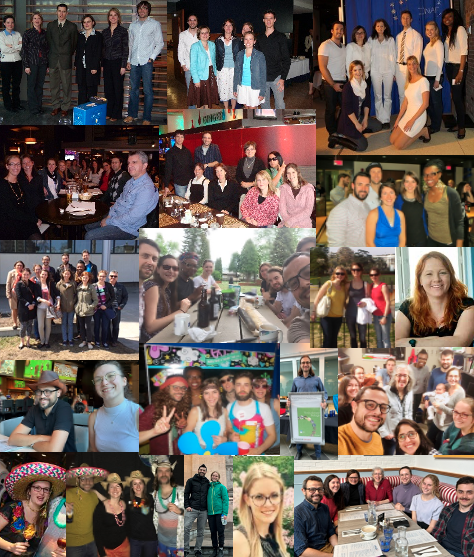
Chairholder: Marie-Claude Vohl
Chair duration dates: June 1, 2010 to May 31, 2024
Funding partners: Canada Research Chairs – Canadian Institutes of Health Research
Keywords: Nutrigenomics, nutrigenetics, personalized nutrition, precision nutrition, obesity, metabolic health
Abstract: Our precision nutrition research explored the impact of fruit and omega-3 on metabolic health, microbiota and gene expression. We analyzed the heterogeneity of responses to bariatric surgery and proposed analytical frameworks to optimize clinical practice in nutrigenomics and nutritional genetics.
Main outcomes: Our research has identified genetic and metabolomic profiles associated with fruit and fatty acid consumption, clarifying their impact on cardiometabolic health and gut microbiota. We refined genetic risk scores to predict plasma triglyceride response to omega-3s, and tested models integrating metabolites and genetics. Our work has also highlighted the effects of maternal obesity on children’s metabolic health. Finally, we have proposed analytical frameworks for gene-environment interaction and established nutrigenomic recommendations, thus contributing to advances in precision nutrition.
Hyperlinks to some of our published works :
- https://www.lapresse.ca/gourmand/alimentation/2019-05-10/les-quebecois-veulent-manger-selon-leur-adn
- https://nouvelles.ulaval.ca/2019/04/26/etes-vous-prets-pour-la-nutrigenetique-d2024a21-ae0a-4d71-9a41-40cf9169b30d
- https://odnq.org/wp-content/uploads/2024/02/Guide-Utilisation-Clinique_Nutrigenomique_2024_Final-Interactif.pdf
- https://www.frontiersin.org/journals/nutrition/articles/10.3389/fnut.2023.1104685/full
- https://libkey.io/libraries/2414/articles/517862508/content-location?utm_source=nomad
- https://df6sxcketz7bb.cloudfront.net/manuscripts/122000/122011/jci.insight.122011.v1.pdf
- https://libkey.io/libraries/2414/articles/43889737/full-text-file?utm_source=nomad
- https://pmc-ncbi-nlm-nih-gov.acces.bibl.ulaval.ca/articles/PMC6358031/
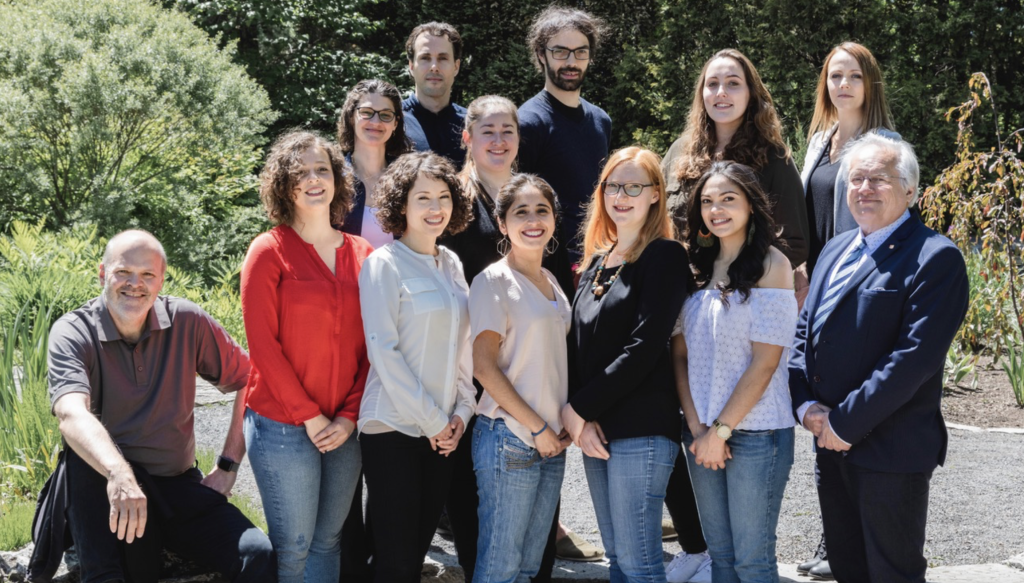
Chairholder: Yves Desjardins
Chair duration: 5 years from May 1, 2018
Team: Denis Roy, Alain Veilleux, Emile Levy
Financial partners: Symrise (Diana Food Canada)
Keywords: polyphenols, berries, proanthocyanidins, microbiota, SHIME, organoids, mucus, Akkermansia, Bidifobacteria, bioavailability, metabolites
Abstract: To determine the reciprocal action of polyphenol-rich fruits and vegetables on the gut microbiota by employing metabolomics and metagenomics approaches. The overall objectives were to:
– Develop innovative technologies to extract, isolate and concentrate polyphenols from fruits and vegetables and their co-products;
– Determine the nature of microbial metabolites derived from colonic fermentation of polyphenols; identify metabo-types capable of metabolizing and potentiating polyphenols from INAF’s cropothèque (fecal sample bank);
– Verify the prebiotic effect of various fruit and vegetable extracts on the growth of beneficial colonic bacteria in an artificial digestive system.
Main spin-offs : The Chair’s research has increased our knowledge of the effect of new functional polyphenolic fractions extracted from fruits and vegetables on the intestine. It has led to a better understanding of :
- This research will help us to better understand
- the factors that determine inter-individual variability in the metabolism of these molecules, depending on the composition of the microbiota
- the dietary factors that help maintain metabolic functions and improve the barrier function of the intestine
marketing of a prebiotic sold worldwide: Prebiocran.
Hyperlinks to some published works :
- Feldman, F., Koudoufio, M., Sané, A.T., Marcil, V., Foisy Sauvé M., Butcher, J., Patey, N., Martel, C., Spahis, S., Duan, H., Figeys, D., Desjardins, Y., Stintzi, A., Levy, E. (2025) Therapeutic potential of cranberry proanthocyanidins in addressing the pathophysiology of metabolic syndrome: a scrutiny of select mechanisms of action. Antioxidants, 14, 268.
- Pulido Mateos, E.C., Lessard-Lord, J., Desjardins, Y., Roy, D. (2024) Lactiplantibacillus plantarum inter-strain variability in the production of bioactive phenolic metabolites from flavan-3-ols. Journal of Agricultural and Food Chemistry 72: 39: 21677-21689.
- Cattero, V., Roussel, C., Lessard-Lord, J., Roy, D., and Desjardins, Y. (2024) Supplementation with a cranberry extract favour the establishment of butyrogenic guilds in the human fermentation SHIME® system. Microbiome Res. Rep.3,
- Lessard-Lord, J., Roussel, C., Lupien-Meilleur, J., Généreux, P., Richard, V., Guay, V., Roy, D., and Desjardins, Y. (2024) Short term supplementation with cranberry extract modulates gut microbiota in human displays a bifidogenic effect. Nature Biofilm & Microbiome. 10:18. DOI.org/10.1038/s41522-024-00493-w
- Lessard-Lord, J., Roussel, C., Guay, V., and Desjardins, Y. (2024). Assessing the gut microbiota’s ability to metabolize oligomeric and polymeric flavan-3-ols from aronia and cranberry. Molecular Nutrition and Food Research. E2300641. DOI.org/10.1002/mnfr.202300641
- Lessard-Lord, J., Lupien-Meilleur, J., Roussel, C., Gosselin-Cliché, B., Plante, P.-L., Silvestri, C., Di Marzo, V., Roy, D., Rousseau, E. and Desjardins, Y. (2024) Mathematical modeling of fluid dynamics in in vitro gut fermentation systems: a new tool to improve the interpretation of microbial metabolism. The FASEB Journal. E23398. dio.org/10.1096/fj.202301739RR
- Lessard-Lord, J., Roussel, C., Guay, V. and Desjardins, Y. (2023) Characterization of the Interindividual Variability Associated with the Microbial Metabolism of (−)-Epicatechin. J. Agric. Food Chem. 71, 13814–13827. doi.org/10.1021/acs.jafc.3c05491.
- Lessard-Lord, J., Auger, P., Demers, S., Plante, P.-L., Picard, P., and Desjardins, Y. (2023). Automated High-Throughput Quantification of Phenyl-γ-valerolactones and Creatinine in Urine by Laser Diode Thermal Desorption. Journal of Agricultural and Food Chemistry. 44. Vol. 71, 16787-16796. doi.org/10.1021/acs.jafc.3c03888
- Medina-Larqué, A.-S., Rodriguez-Daza, M.-C., Roquim, M., Dudonné, S., Pilon, G., Levy, É., Marette, A., Roy, D., Jacques, H., and Desjardins, Y. (2022) Cranberry polyphenols and agave agavins impact gut immune response and microbiota composition while improving gut barrier function, inflammation, and glucose metabolism in mice fed an obesogenic diet. Front. Immunol. 13, 871080. doi.org/10.3389/fimmu.2022.871080
- Pulido-Mateos, E.C., Lessard-Lord, J., Guyonnet, D., Desjardins, Y., and Roy, D. 2022. Comprehensive analysis of the metabolic and genomic features of tannin transforming Lactiplantibacillus plantarum strains. Scientific Reports. 12 (1): 22406. doi.org/10.1038/s41598-022-26005-4
- Feldman, F., Koudoufio, M., El-Jalbout, R., Foisy Sauvé, M., Ahmarani, L., Sané, A. T., El-Houda Ould-Chikh, N., N’Timbane, T., Patey, N., Desjardins, Y., Stintzi, A., Spahis, S., and Levy, E. (2022). Cranberry proanthocyanidines as a therapeutic strategy to curb metabolic syndrome and fatty liver-associated disorders. Antioxidants. DOI: 10.3390/antiox12010090
- Roussel, C., Chabaud, S., Lessard-Lord, J., Cattero, V., Pellerin, F.-A., Feutry, P., Bochard, V., Bolduc, S., and Desjardins, Y. (2022) UPEC Colonic-Virulence and Urovirulence Are Blunted by Proanthocyanidins-Rich Cranberry Extract Microbial Metabolites in a Gut Model and a 3D Tissue-Engineered Urothelium. Microbiol. Spectr.10, e02432-21 (2022). doi.org/10.1128/spectrum.02432-21.
- Pulido-Mateos, EC; Lessard-Lord, J; Guyonnet, D; Desjardins, Y; Roy, D (2022) Comprehensive analysis of the metabolic and genomic features of tannin transforming Lactiplantibacillus plantarum strains. Scientific Reports: 12(1): 22496. doi.org/10.1038/s41598-022-26005-4
- Koudoufio, M., Feldman, F., Ahmarani, L., Delvin, E., Spahis, S., Desjardins, Y. and Levy, E. (2021). Intestinal protection by proanthocyanidins involves anti-oxidative and anti-inflammatory actions in association with an improvement of insulin sensitivity, lipid and glucose homeostasis. Sci Rep. 11(1):3878. doi.org/10.1038/s41598-020-80587-5
- Rodríguez-Daza,M.C., Pulido Mateos, E. C., Lupien-Meilleur, J., Guyonnet, D., Desjardins, Y. and Roy, D. (2021). (Poly)phenol-mediated gut microbiota modulation: toward prebiotics and further. Frontiers in Nutrition. *: 689456 doi.org/10.3389/fnut.2021.68
- Feldman, F., Koudoufio, M., Desjardins, Y., Spahis, S., Delvin, E. and Levy, E. (2021). Efficacy of Polyphenols in the Management of Dyslipidemia: A Focus on Clinical Studies. Nutrients 13 (2), 672. doi.org/10.3390/nu13020672
- Koudoufio, M., Desjardins, Y., Feldman, F., Spahis, S., Delvin, E. and Levy, E. (2020). Insight into polyphenol and gut microbiota crosstalk: Are their metabolites the key to understand protective effects against metabolic disorders? Antioxidants, 9(10): doi.org/10.3390/antiox9100982
- Denis, M.-C., Dubé, P., Dudonné, S., Desjardins, Y., Matei, C., Delvin, E., Levy, É. and Furtos, A. (2020). Characterization of bioactive cranberry fractions by mass spectrometry. Can. J. Chem.. doi.org/10.1139/cjc-2020-0070.
- Medina-Larqué, A. S., Desjardins, Y. and Jacques, H. (2020). Chap. 24. Cranberry, oxidative stress, inflammatory markers, and insulin sensitivity. In Diabetes Oxidative Stress and Dietary Antioxidants, pp. 245-251, 2nd ed., Preedy V.R. Ed., Elsevier Academic Press. ISBN: 978-0-12-815776-3. doi.org/10.1016/B978-0-12-815776-3.00024-3
- Rodriguez-Daza, M C, L Daoust, L Boutkrabt, G Pilon, Thibault Varin, S Dudonné, E Levy, A Marette, D Roy, and Y Desjardins. (2020) Wild Blueberry Proanthocyanidins Shape Distinct Gut Microbiota Profile and Influence Glucose Homeostasis and Intestinal Phenotypes in High-Fat High-Sucrose Fed Mice. Scientific Reports. 10:2217. doi.org/10.1038/s41598-020-58863-1
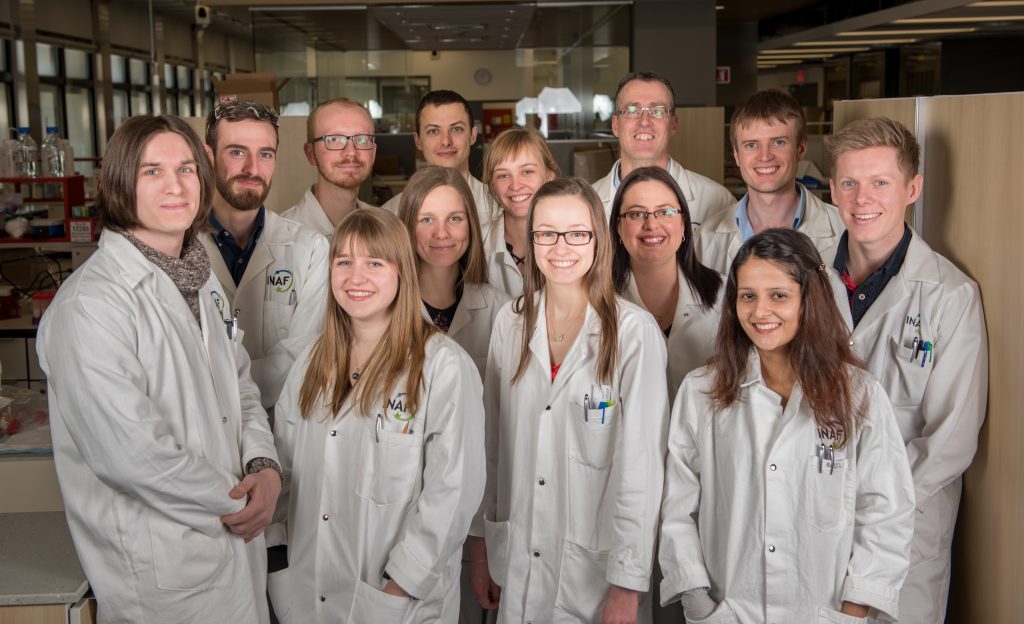
Chairholder: Laurent Bazinet
Chair duration: 2016 – 2022
Financial partners: Ocean NutraSciences Inc, Fruit d’Or, Parmalat (now Lactalis Canada), Eurodia, Amer-Sil, Fondation François Bourgeois, NSERC, CRIBIQ
Keywords: Electromembrane processes; juice deacidification; whey demineralization; functional foods; bioactive ingredients; membrane manufacturing; eco-efficiency; life-cycle analyses
Summary: The PEMECO Chair has enabled us to 1) optimize bio-food production lines using electromembrane approaches, 2) minimize their environmental impact and increase the added value of end products, 3) demonstrate the health benefits of new eco-designed products, and 4) understand the biological mechanisms involved.
Main spin-offs: In response to the partners’ issues, the Chair has led to 1) the creation of new functional foods by incorporating fractions shown to be bioactive, 2) the production of deacidified beverages that reduce the risk of intestinal inflammation, and 3) the development of industrial processes that reduce input requirements, minimize waste and increase the value of these products. In addition, the tools and data generated have contributed to the development of nutraceuticals and functional foods currently unavailable on the market, to improving the valorization of their co-products and to eco-conceiving of the team website to see news and publications during this period.
Communications in the media and social media during the PEMECO Chair
- «Finie l’acidité dans le jus de canneberge» Le Soleil, Friday, November 4, 2016, p.8. News section.
- «Une alimentation plus santé et plus verte» Le FIL, Thursday, November 10, 2016, Vol. 52, Issue 9, p.7.
- «Des procédés de production verts et une valeur ajoutée pour les aliments». FSAA website, InfoFSAA, Thursday, November 10, 2016.
- «Chef de file international en électrodialyse» Le FIL, Thursday, January 19, 2017, Vol. 52, Issue 15, p.6.
- «Laurent Bazinet et son équipe parmi les leaders mondiaux dans le domaine de la recherche en électrodialyse» INAF website, Thursday, January 24, 2017.
- «L’Université Laval, chef de file international en électrodialyse». FSAA website, InfoFSAA, Thursday, January 26, 2017.
- «Des procédés innovants autour des aliments fonctionnels» La Terre de Chez Nous, Wednesday, September 20, 2017, A25.
- «Démystifier le génie alimentaire» FSAA News, January 23, 2020.
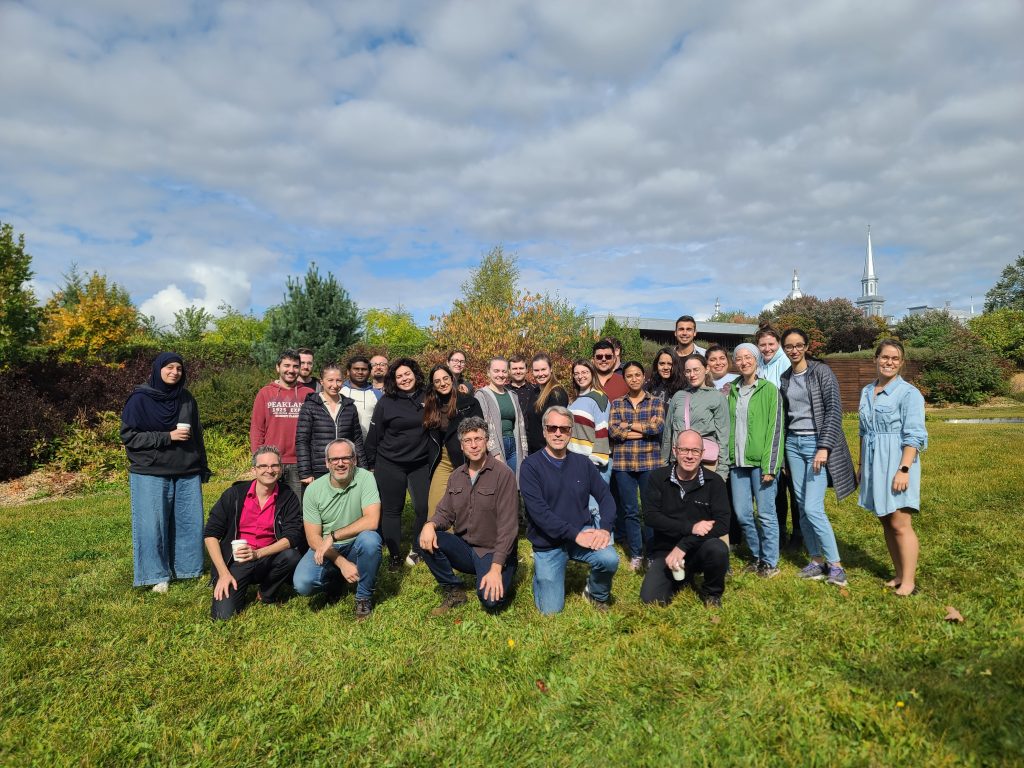
Chairholder: Vincenzo Di Marzo
Chair duration: June 1, 2017 to May 31, 2025
Team: Cristoforo Silvestri, Nicolas Flamand, Alain Veilleux, Frédéric Raymond
Funding partners: INAF, CIHR, IUCPQ, FMED, NSERC, SSHRC, NUTRISS
Keywords: microbiome, microbiota, gut, intestines, endocannabinoidome, obesity, cannabinoid
Abstract: The main objective of CERC’s research is to understand whether the extended endocannabinoid system, or endocannabinoidome, which includes over 200 lipid mediators, more than 15 different receptors and 40 metabolic enzymes controlling mediator levels, is an important component of the complex chemical mechanisms of communication between host cells and the gut microbiota, in the context of metabolic regulation and its pathological dysfunctions (hyperphagia, visceral obesity, dyslipidemia, insulin resistance, type 2 diabetes, hepatic steatosis and other peripheral and central comorbidities of obesity, such as depression and anxiety).
Main spin-offs: The results of CERC’s research activities, obtained from in vivo studies on animal models and human subjects, as well as using in vitro and ex vivo models (primary or stem cell cultures, biopsies, organoids, and bacteria), aim to identify new molecules derived from the gut microbiota. The molecules targeted are in particular those capable of influencing the host endocannabinoidome, which could form the basis for the development of new pharmacological, nutritional and lifestyle interventions to restore or preserve metabolic, cardiovascular and mental health.
At the same time, the results aim to understand how pathological perturbations of the host endocannabinoidome signaling system can alter the gut microbiota ecosystem and thus its physiological action.
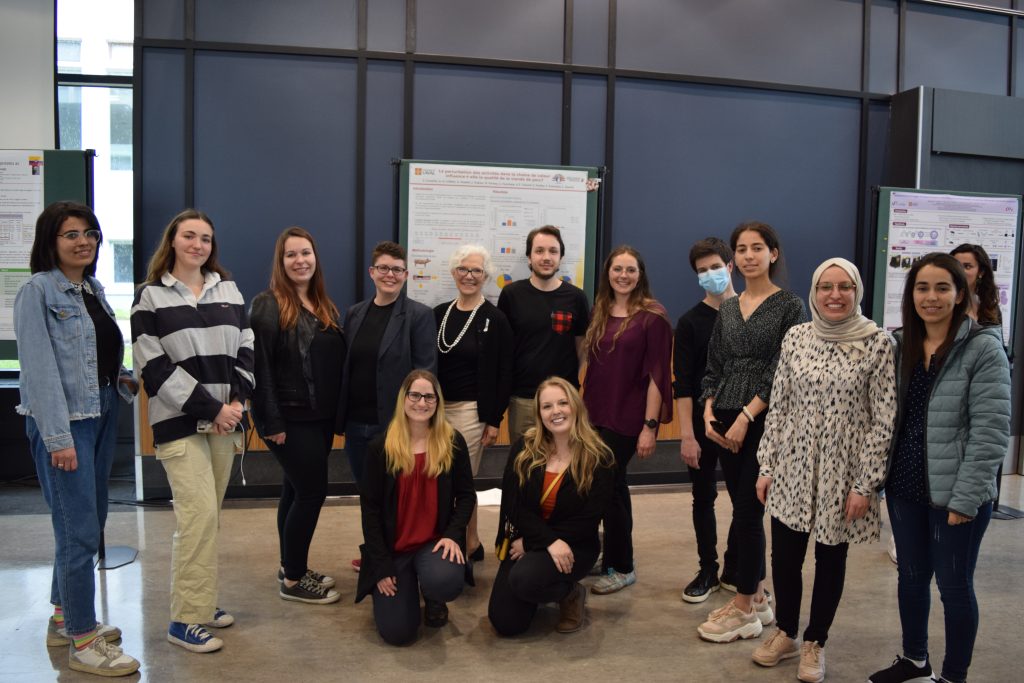
Chairholder: Prof. Linda Saucier Ph.D., agr., chm.
Chair duration dates: 2020 – 2025
Team: Co-applicants Prof. Frédéric Raymond Ph.D.; Prof. Nabeel Alnahhas Ph.D.
Financial partners: Olymel S.E.C./L.P.; Sollio Agriculture; Kersia; Centre de développement du porc du Québec inc.
Keywords: meat, quality, safety, hygiene, security, microbiota, value chain
Summary: La Chaire de recherche MuscULo is to improve the quality and safety of meat products in order to reduce food loss and waste and maintain the competitiveness of the meat production and processing sector.
Key benefits: In a sustainable and integrated approach, the Chair will develop new strategies, including a new generation of sanitary interventions, at every link in the agri-food chain to better meet consumer demands.
Hyperlinks to some published works :
- Monger XC*, Gilbert A-A*, Saucier L, Vincent AT. 2021. Antibiotic resistance: From pig to meat. Antibiotics, 10: 1209.
- Monger XC*, Saucier L, Gilbert A-A, Gosselin S, Pouliot É, Fournaise S, Vincent AT. 2024. Resilience of loin meat microbiota and of resistance genes to a chlortetracycline treatment in weaned piglets. Antibiotics, 13:997.
- Monger XC*, Saucier L, Guay F, Pouliot É, Fournaise S, Vincent AT. 2024. Effect of a probiotic and an antibiotic on the mobilome of the porcine microbiota. Frontiers in Genetics, 15:1355134. doi:10.3389/fgene.2024.1355134
- Laforge P*, Vincent AT, Duchaine C, Feutry P, Dion-Fortier A, Plante P-L, Pouliot É, Fournaise S, Saucier L. 2023. Contribution of farms to the microbiota in the swine value chain. Frontiers in Systems Biology, 3(12 juillet) :1183868. doi: 10.3389/fsysb.2023.1183868
- Sammari H*, Askri, A*, Benahmed S*, Saucier L, Alnahhas N. 2023. A survey of broiler breast meat quality in the retail market of Quebec. Canadian Journal of Animal Science, 00:1-14 (28 avril). dx.doi.org/10.1139/CJAS-2023-0001
- Gosselin S*, Gilbert A-A*, Touahri A*, Fecteau H, Vincent AT, Pouliot É, Fournaise S, Saucier L. 2023. Meat plant resilience to temporal variability of pork meat quality. 69thInternational Congress on Meat Science and Technology (ICoMST), August 20-25th, Padova, Italie. (Grappe Innovation). Disponible sur Digicomst.
- Saucier L, Laforge P*, Vincent AT, Dion-Fortier A, Plante P-L, Pouliot É, Fournaise S. 2023. Exploratory study to identify potential metabolic biomarkers to foresee the impact of heard health status on meat microbial quality. 69th International Congress on Meat Science and Technology (ICoMST), August 20-25th, Padova, Italie. (Grappe Innovation, Chaire de recherche MAPAQ sur la qualité et la salubrité de la viande – Musculo). Disponible sur Digicomst.
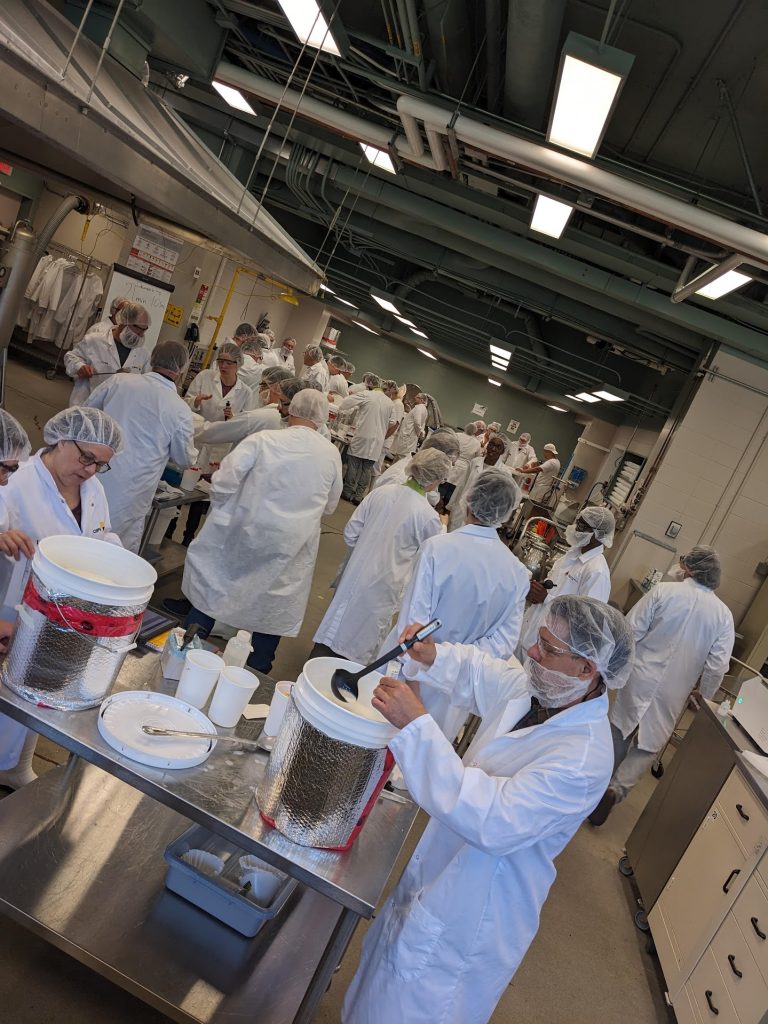
Chairholder: Julien Chamberland
Chair duration: March 2020 – November 2025
Team: J. Chamberland, Y. Pouliot, A. Doyen, S. Labrie, G. Brisson
Financial partners: MAPAQ, Novalait, Agropur, Lactalis Canada, Saputo, Conseil des industriels laitiers du Québec (CILQ), Centre d’expertise fromagère du Québec (CEFQ)
Key words: Cheese processing, Efficiency, Variability control, Continuous cheese training
Summary: The CLE in cheese technology has created a true center of excellence in cheese technology by setting up a research program exclusively dedicated to the sector, and designing unique training programs equipping both new graduates and industry stakeholders with the challenges of the dairy industry.
Key benefits: Here are just a few examples: completion of 4 applied research projects in partnership with CLE’s industrial partners, direct and indirect training of more than 24 undergraduate and graduate students, a graduate microprogram in cheese technology, creation of three university courses, organization of a specialized summer school on milk coagulation attended by more than 24 industry participants from both artisanal and industrial companies, creation of continuing education opportunities on spun pastes, processed cheeses, filtration technologies or standardization of fro-milks.
Chairholder: Benoît Lamarche
Chair dates: 2001 to 2011
Funding partners: Canada Research Chair, CIHR
Keywords: nutrition, cardiometabolic health, cardiovascular health
Summary: Investigate the link between diet and cardiometabolic and cardiovascular health.
Main outcomes: More than thirty students trained in graduate studies, more than 160 peer-reviewed publications.
Chairholder: Stephen Cunnane
Chair duration dates: 1st term – 2022 – 2027
Funding partners: Nestlé Health Science, Université de Sherbrooke
Keywords: ketones, cardiometabolic health, neurodegenerative diseases, metabolic psychiatry
Summary: This Chair aims to evaluate whether ketones have a beneficial therapeutic role in certain diseases, notably neurodegenerative and psychiatric diseases, but possibly cardio-renal diseases too.
Main spin-offs: Studies leading up to the creation of this Chair included clinical trials, the results of which led to the development of a ketogenic beverage based on medium-chain triglycerides (MCTs), currently marketed in Europe under the name BrainXpert for people with mild age-related cognitive decline. MCTs are the only natural product approved by Health Canada to treat mild cognitive decline. The activities of this Chair have also led to a multi-center randomized clinical trial in Europe and the United States to assess whether MCTs could slow Alzheimer’s disease.
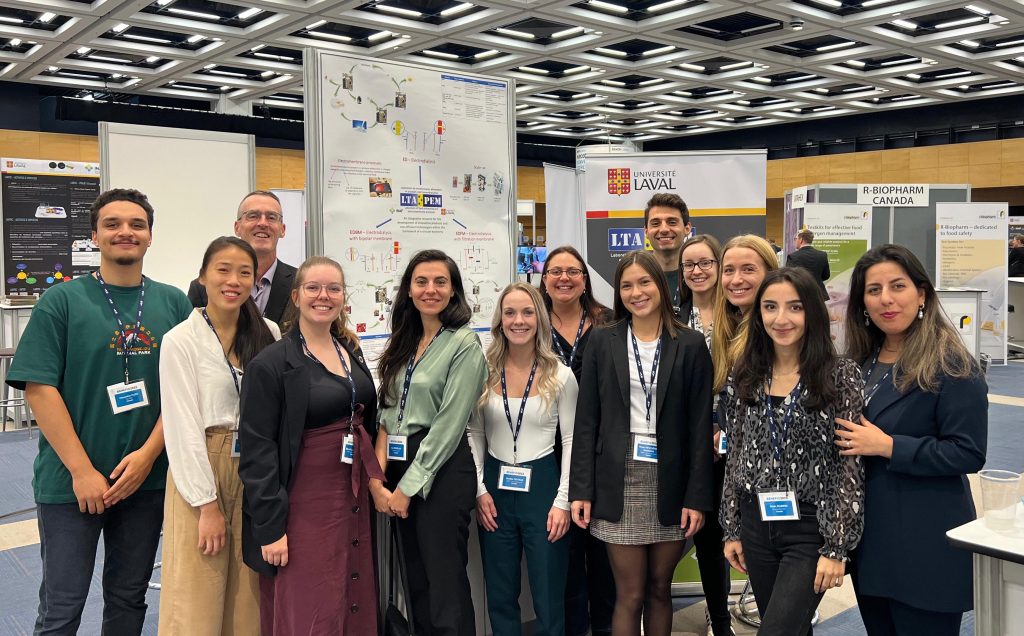
Chairholder: Laurent Bazinet
Chair duration: 2022-present
Financial partners: Olymel, Exceldor, Montpak International, Innodal, Fruit d’Or, Lactalis Canada, Eurodia, Amer-Sil, NSERC, CRIBIQ
Keywords: electromembrane processes; valorization of co-products; circular economy; cruor; duckweed; cranberry juice; white water; antimicrobial ingredients; food preservation
Abstract: The VITALE Chair aims to 1) develop technological approaches to optimize the valorization of bio-food co-products while minimizing their environmental impact and increasing their added value, 2) demonstrate the implication of these technologies in a circular economy context and 3) validate the health effects of new eco-designed products.
Main spin-offs: The Chair will offer more than 20 students the opportunity to acquire interdisciplinary training in fields that are currently booming, and where there is a crying shortage of expertise and highly qualified personnel. In addition to improving eco-efficiency through innovative processes, this Chair will lead to the marketing of unique products and ingredients with scientifically proven bioactivities. The anticipated economic spin-offs for the partners in the medium and long term are over $10 million/year and the creation of more than 15 jobs.
Hyperlinks to published works: See the publications and news section of the team’s website for news and publications during this period.
Media and social media communications during the VITALE Chair :
- Chaire VITALE, INAF News, June 28, 2022.
- «De nouveaux agents de conservation alimentaire produits à partir du sang de porc», Ulaval Nouvelles, January 10, 2023.
- «Lentilles d’eau : un procédé pour tirer profit de ces miniatures usines à protéines», Ulaval News, November 2, 2023.
- «A small aquatic plant, duckweed, could revolutionize the food of tomorrow», The Conversation, July 17, 2024.
- «The small aquatic plant “duckweed” has the potential to revolutionize the future of food», project design (Japan), August 2024.
- «Une plante aquatique pourrait révolutionner l’alimentation de demain», Le bel Âge, October 2024.
- «Une petite plante aquatique pourrait révolutionner l’alimentation de demain», L’Actualité, November 5, 2024.
The INAF 25th Anniversary
Student Involvement Scholarships
During the INAF Student Symposium held on February 19 and 20, 2025, we had the pleasure of awarding 26 scholarships for student involvement as part of the Institute’s 25th anniversary. Here are the names of the winners:
- 2,500 scholarship: Camille Lavoie – Emilie Bernier -Geneviève Pellerin – Guillaume Morin – Isabelle Bourdeau Julien – Justine Chouinard – Laurence Palin – Marie Cyrenne Dussault – Romain Canuel – Thomas Sire – Virginie Drolet-Labelle
- 1,000 scholarship: Amélie Loiselle – Briscia Anaid Tinoco – Clémence Desjardins – Elise Heinen – Julia Lévy-Ndejuru – Justine Morand – Khaled Abdallah – Linda Amayele Sanka – Lise Leblay – Marianne Rochette – Marie-Pierre Légaré-Baribeau – Maude Plouffe
- 500 scholarship : Ashley Middleton – Delasa Rahimi – Marie-Ève Collard
PHOTO ALBUM
BY INAFIENNE AND INAFIEN
We’d like to share with you an archive of photo albums from the Flickr platform from INAF’s inception to 2024.

Thank you so much!
INAF would like to express its deep gratitude to all those who have contributed to its development and influence. Thank you to all INAF members, researchers, professionals and administrative staff for their passion, expertise and constant commitment, which have enabled the Institute to become a center of excellence in research. Our partners and collaborators, both academic and industrial, have been essential allies in our growth, making the Institut a key player in the bio-food world. Thanks to our collective efforts, a fertile environment for innovation and collaboration stands proudly, building the sustainable food of tomorrow.
